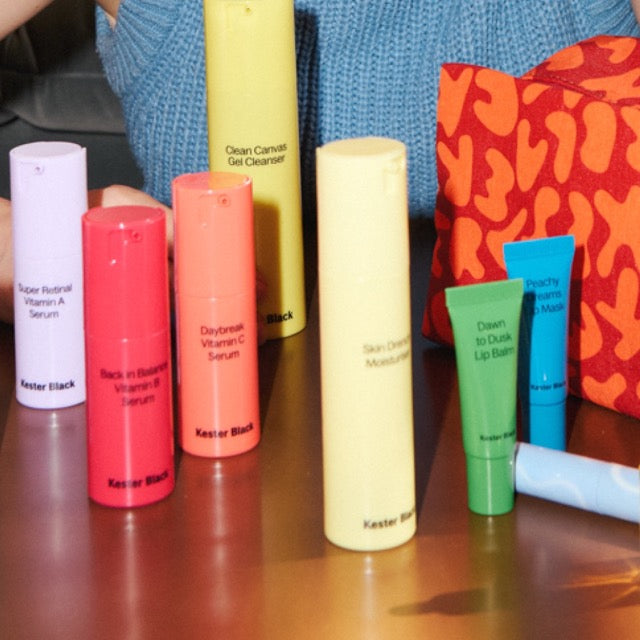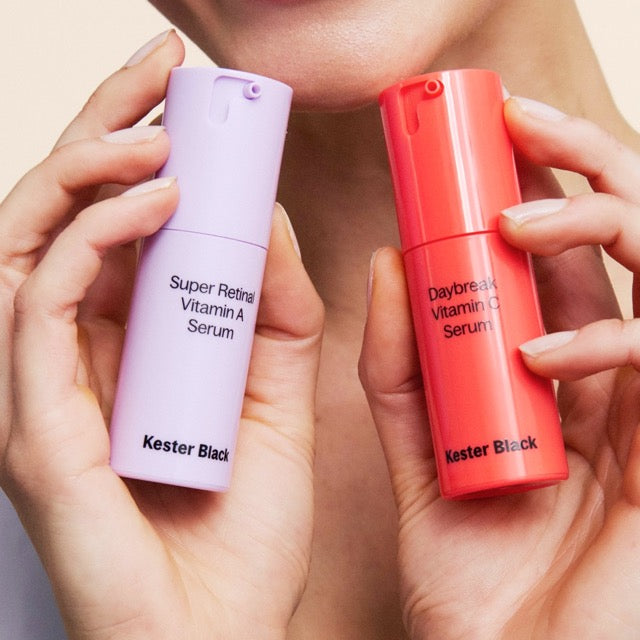How to set goals and stick to good habits this year
11 January 2023 – 4 min read
At Kester Black, we’re all about a holistic approach to beauty; we’re just as focussed on the inside as we are the outside. After the last few years, it’s more important than ever to look after our whole selves. So, given we all start a new year with new intentions, promises and goals, we thought we’d share tips we’ve learnt from some of our favourite books and authors over the next few weeks to help inspire some changes you might like to make this year. We’ll be basing this series around Paul Chek’s four pillars of health: Happiness, Movement, Quiet and Diet.
But we know how it (usually) goes. After the dust has settled post- Christmas and New Year’s and everyday routines come back into focus, all of those promises we made for 2023 and the lofty new year goals we made suddenly feel so… big.
Come February, our grand plans for a ‘new year, new me’ are all-but-forgotten or filed away in the too-hard-basket. And this year we want things to be different for you. We want to take a completely different approach to setting intentions and goals. Something a bit more grounded in science and research to make your goals achievable and to help you accomplish what you’ve set out for 2023.
So we’re kicking off with some fundamentals - setting goals and changing habits. No matter what you want your 2023 to be or look like, it’s always good to start with a plan and understand the mechanics of how we can go about making change and making that change stick.
Goal setting
That old rule of setting SMART goals still rings true. Goals that are Specific, Measurable, Achievable, Relevant and Time-Bound have more clarity and purpose, and give you a framework to achieve them. It may sound boring and very business-like, but it doesn’t have to be. Which is why we’ve created our goal setting worksheets to help you visualise your life, map out your goals, and set your intentions. We’ve divided these into 3 different topics, which you can download below:
Goal setting worksheets
-
Reflections: Looking back is the most important part of moving forward. By noting what we achieved, our successes and our shortcomings, we can adapt where change may be needed. It’s also the best time to celebrate ourselves, which we definitely don’t do often enough.
- Goals and intentions: Sometimes we set all of our goals too big - and we definitely want you to dream big (that’s in there!) - but here’s where you can jot down those smaller rituals (maybe you want to set aside 5 minutes every morning to meditate, or you want to go for a pre-work walk three times in the week), as well as what you want out of your career. These can be revisited, revised and added to as often as you need, as long as you’re always keeping your core values at the heart of your goals.
- Vision board: Think about your year and what you want for yourself. Do you want to travel more? Do you want to move up the ladder in your job? Maybe you want to go on more dates. Think of these as the end result you want to achieve, and then work out all the small steps that you might need to achieve them.
Tips for keeping up a habit
Changing habits is not easy. But you can teach an old dog new tricks, and one of our favourite resources for this comes from Atomic Habits by James Clear, which encourages small changes to see the results you want. We highly recommend reading it for some pointers on simple rules for creating good habits and breaking bad ones, but the four stages of forming new habits include Noticing, Wanting, Doing and Liking:
-
Noticing: The first step is having clarity on what you want to change and explicitly stating when, where, and how you will implement the habit.
-
Wanting: Be a positive force in making your good habits easier to achieve instead of hoping it will happen. Want to go running in the morning? Put your alarm out of reach and your workout gear at the foot of your bed.
-
Doing: Focus on starting the habit, not the outcome. If you want to run more, focus on getting up and out there, not on how many kilometres you’ll run. That will come.
- Liking: The more we like something, the more we’ll do it. Reward yourself in the short-term and not think about the long-term goal (for example, running 5km straight). Experts recommend getting a wall calendar where you can mark an ‘X’ on every day that you’ve achieved your new good habit to measure your progress in a tangible, feel-good way.
Consistency and repetition are the keys to forming new habits, and even new identities (the goal is not to run a marathon, the goal is to become a runner) - and we know you can do it!
















